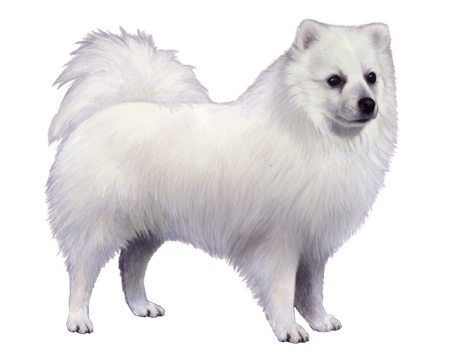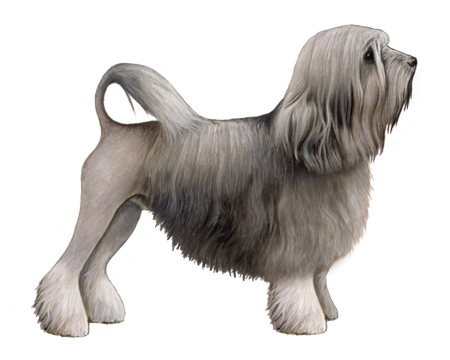
Coton de Tulear
The Coton de Tulear has only had one job in its long history: providing companionship and joy to its owners. This charming, outgoing, and happy-go-lucky breed excels in its work—making it a popular breed worldwide.
Interested in discovering if your dog is a Coton de Tulear?
Check out Wisdom Panel's DNA tests.

Coton de Tulear Traits
General Appearance
The Coton de Tulear is an intelligent, energetic, and sometimes boisterous little dog with a pure white coat.
Coat and Coloring
As its name suggests, the Coton de Tulear has a cotton-like coat. The coat is dense and profuse and can have a light wave. Puppies have much softer coats than adult dogs.
The Coton de Tulear comes in a single color: white. According to the breed standard, their ears and bodies can have slight shadings of light grey or light tan.
Distinctive Physical Traits
The Coton de Tulear has a small, almost triangular-shaped head and straight muzzle. Pendulous ears, rounded black or dark brown eyes, and a curious, alert expression contribute to this little dog's adorable appearance.
Coton de Tulear Temperament
Coton de Tulears are known for their friendly, stable natures and ability to adapt to a variety of circumstances. These little dogs can handle apartment living, wide-open spaces, desert heat, or winter snow—as long as their families are near.
In addition to being excellent lap dogs, Coton de Tulears are natural entertainers. They love learning new tricks (their signature move is walking on their hind legs) and delighting their humans. Their outgoing nature and love of attention make them excellent therapy dogs.
Though generally quiet, Coton de Tulears can become very vocal when having fun. They get along with most people and other pets. Because they'd rather be with people than alone, this breed is prone to separation anxiety.


Coton de Tulear History
The Coton de Tulear has a long association with the high seas. Sailors chose this breed as their ship companions. These little white dogs chased rats and provided endless entertainment—and made excellent items for barter. The Coton de Tulear owes its name to its arrival at the port of Tulear in Madagascar, an island nation with a significant French-speaking population.
The Coton de Tulear is a member of the Bichon family of dogs and believed to be a descendant of a Spanish breed known as the Bichon Tenerife. Regardless of its origins, Madagascar's ruling aristocrats fell in love with the charming good looks and comedic personalities of the Coton de Tulear and adopted it as their preferred breed. At one point, it was the exclusive breed of nobles and illegal for commoners to own. It became known as the Royal Dog of Madagascar. The dogs rarely left the island, keeping their bloodlines pure for centuries.
French travelers discovered the breed during a visit to Madagascar in the 1960s. They exported Coton de Tulears to Europe, where the breed was an immediate hit.
Coton de Tulear Care
Nutrition
When choosing the right diet for a Coton de Tulear, look for high-quality dog foods appropriate for their age and breed size. Like all dogs, Coton de Tulears are at risk for obesity if they overeat—and calories can add up quickly for such a little dog. Avoid overfeeding by measuring their meals and keeping treats to less than 10% of their daily calories.
Grooming
The natural hair of a Coton de Tulear requires regular brushing to remove dirt and prevent it from becoming tangled and matted. Be sure to brush the hair starting at the skin. Failing to run the brush through the entire length of their hair could create painful mats close to the skin. A spray-on conditioner designed for dogs can prevent the hair from breaking and allow a comb to glide through more easily. Some Coton de Tulears get a "puppy clip" to keep their hair short and minimize their grooming requirements. Regular nail trims are also necessary.
Coton de Tulears will benefit from regular dental care. Start brushing their teeth at home when they're young and talk to a veterinarian about professional dental cleanings to ensure good oral hygiene throughout their lives.
Exercise
Coton de Tulears are active dogs that require regular exercise. Due to their small size, short walks are better than long hikes. They have a playful nature, so add in games like fetch and provide plenty of toys to keep them engaged. These are dogs that want to interact with their people, so participating in playtime (instead of leaving them to entertain themselves) is preferred.
Training
A high level of intelligence and desire to entertain make the Coton de Tulear a natural for learning new tricks. Keep training sessions upbeat and use positive reinforcement and rewards-based training to help them become confident, well-mannered dogs. Consider training activities that allow for bonding, such as competitive obedience or agility classes.

Coton de Tulear Genetic Health Conditions
-
Canine Multifocal Retinopathy 2
Canine Multifocal Retinopathy 2 (CMR2) is an eye disorder that can cause retinal decay which may impact vision, but very rarely results in blindness.
-
Chondrodystrophy (CDDY) and Intervertebral Disc Disease (IVDD) Risk
Chondrodystrophy (CDDY) is a skeletal disorder characterized by shortened limbs and abnormal early degeneration of the spinal discs, or intervertebral disc disease (IVDD), which predisposes to disc herniation.
-
Bandera's Neonatal Ataxia
Bandera's Neonatal Ataxia (BNA), discovered in the Coton de Tulear, is a severe brain problem that affects a puppy's ability to move its body properly.
-
von Willebrand's Disease, type 1
von Willebrand's Disease (vWD) Type 1 is a blood clotting disorder that typically causes mild bleeding tendencies although some affected dogs may have more severe signs. It is the result of low levels of von Willebrand's factor, a blood protein that helps stabilize blood clots.
Knowing if your Coton de Tulear is a carrier or at-risk for these conditions can help you and your veterinarian plan for your pup’s lifelong care. With Wisdom Panel™ Premium, you can get results for over 200 genetic health tests.
Breed Group
Companion
This group consists of dogs typically bred for the specific purpose of human companionship, and many are popular pets because of their gentle nature. They became more common as the concept and luxury of dogs as pets prevailed.



























_Color.png)





















